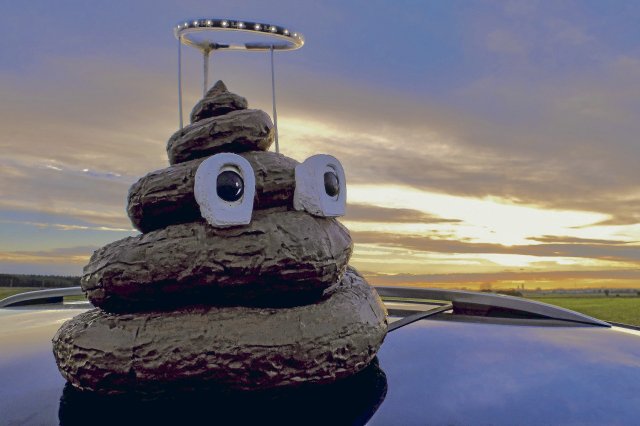On behalf of enlightenment, director Abruña follows poop around the world.
Photo: Thurn Film
The New York filmmaker Rubén Abruña is clearly aware that the subject of his film must seem extremely repulsive at first glance. And so he devotes the first few minutes of “Holy Shit,” a documentary about human excrement, to breaking down prejudices against disgusting things, and he demonstratively eats a piece of his subject, namely, well, shit made of chocolate.
This opening scene has little to do with what will ultimately be discussed in the film, but it does give an idea that Abruña not only sees the comic side of his subject, but also has great fun highlighting it. And so in “Holy Shit” “shit”, “piss” and “poop” are said so often and with conviction that it is a real joy.
nd.Kompakt – our daily newsletter

Our daily newsletter nd.Compact brings order to the news madness. Every day you will receive an overview of the most exciting stories from the world editorial staff. Get your free subscription here.
While “Holy Shit” exudes a feel-good atmosphere, it is actually about a very serious topic, and when Abruña, voiced by Christoph Maria Herbst in the German version, explains at the end of the film that he wants “the poop back to the loop” and “start a toilet revolution”, then he is quite serious about that too. Because that’s what “Holy Shit” is primarily about: Human industrial society makes a gigantic effort to dispose of its own waste (often in rivers and seas) instead of processing it and using it again, for example as fertilizer, humus or as an energy source into the natural cycle
Abruña traveled to 16 cities on four continents to make the case that this could be possible, and that the current approach not only wastes resources and water, but is problematic in other ways. So he visits a Chicago sewage treatment plant, a farmer from Maine who has poisoned his soil with sewage sludge that was supplied to him free of charge by the state sewage treatment plant. Or a slum in Kampala, the capital of Uganda, where some of the excrement is pumped out but then dumped uncontrollably into the surrounding area. Or house projects in Europe, some of which are no longer connected to the sewage system because they recycle the waste of their residents.
In addition to the very catchy and pleasantly entertaining narrative, one of the film’s greatest strengths is that it presents sometimes quite complicated relationships in a very stringent and understandable way, such as how a sewage treatment plant works or the processes involved in composting.
Unfortunately, Abruña remains largely uncritical of the institutions portrayed, the people interviewed and her own narrative. For example, Robert Backus, the CEO of the Rhinebecker Omega Institute, speaks in detail and is allowed to explain his “ecomachine,” which can produce recycled groundwater from fecal water using certain plants that remove the toxins from it. As understandable as it is to present this “machine” as an interesting experiment, a classification would have been necessary here. What we don’t know is that the Omega Institute is by no means a recognized scientific institution, but rather a bit of an esoteric slingshot and ideologically refers, among other things, to “Sufism”, a mystical movement of Islam that recognizes Sharia law as its guiding principle.
Instead, Backus’ statements are easily embedded into the narrative, which values scientific support. Such journalistic unreliability is at least annoying, as it also reduces the credibility of the report as a whole. This is unfortunate in the case of “Holy Shit,” because Abruña’s agenda is basically worth supporting and many of his stories and episodes about pee and poop are quite informative. Particularly the events mentioned in Kampala or Uganda, where several residents of a slum set out to not only solve the problem with excreta with easy-to-install dry toilets, but also to produce soil and fertilizer from the collected human excreta, which in turn can be sold on or used Cultivation of crops can be used.
This closing of the ecological cycle of growing food, absorbing it and returning the waste is illustrated with further examples in the course of “Holy Shit” and we consider how such recycling could also work in cities and on a large scale.
Abruña and the people he introduces in the film leave little doubt that the mass use of the concepts presented, most of which have been around for decades, is failing less because of a lack of implementation options than because the wastewater and fertilizer industries are subject to low-threshold measures and do not want to let cheaper alternatives take away a profitable business at any price.
David Lewis, who had already warned about the dangers of sewage sludge in the 1990s, but was sidelined by the US Environmental Protection Agency (EPA), for which he worked, and later drew attention to himself as a whistleblower, puts it this way in the film: »It is the universal truth: in the end everything, even in science, revolves around money and politics.«
“Holy Shit”, Germany, directed by Ruben Abruña. 86 min. Start: November 30th
Subscribe to the “nd”

Being left is complicated.
We keep track!
With our digital promotional subscription you can read all issues of »nd« digitally (nd.App or nd.Epaper) for little money at home or on the go.
Subscribe now!
judi bola link sbobet link sbobet judi bola
